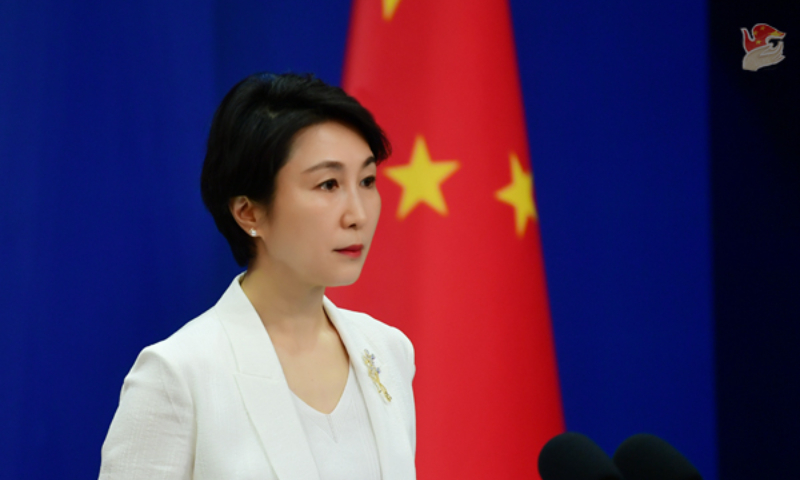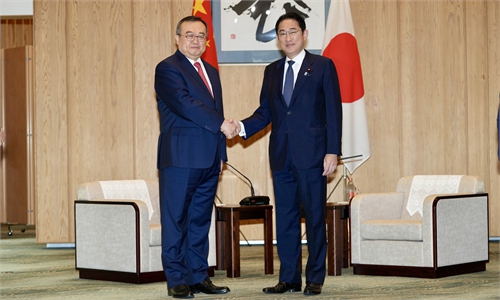Remarks from US, SK, Japanese military officials on South China Sea and Taiwan question malicious smear and blatant interference on China’s domestic affairs: FM spokesperson

Chinese Foreign Ministry spokesperson Mao Ning Photo: fmprc.gov.cn
China expressed strong dissatisfaction and firm opposition against the remarks made by military officials from the US, Japan and South Korea to criticize China on issues regarding South China Sea and the Taiwan question, a Chinese Foreign Ministry spokesperson said on Tuesday, noting that such criticism is blatant interference in China's domestic affairs, maliciously attacking and smearing China on maritime issues, deliberately provoking China's relations with neighboring countries, seriously violating the basic principles of international relations.
US Secretary of Defense Lloyd Austin, Japanese Minister of Defense Kihara Minoru, and South Korean Minister of National Defense Shin Won-sik convened a Trilateral Ministerial Meeting on Monday in Singapore.
A release produced following their meeting claimed that those officials strongly oppose any unilateral attempts to change the status quo in the waters of the Indo-Pacific, and they recalled their respective positions regarding the dangerous and aggressive behavior by China supporting unlawful maritime claims that they have recently witnessed in the South China Sea.
Moreover, they recognized that there is no change in their basic positions on island of Taiwan and emphasized the importance of peace and stability across the Taiwan Straits as an indispensable element of security and prosperity in the international community. They called for the peaceful resolution of cross-Straits issues.
Chinese Embassy in South Korea expressed strong dissatisfaction and firm opposition to South Korean officials' claim on Taiwan question, and has lodged a stern representation with the South Korean government.
Taiwan is an inseparable part of Chinese territory, and the Taiwan question is purely China's internal affair, not allowing any external interference. The one-China principle is the cornerstone for maintaining peace across the Taiwan Straits and the prerequisite and foundation for China to establish and develop relations with all countries. "Taiwan independence" and peace across the Taiwan Straits are as incompatible as fire and water, said an embassy spokesperson.
Claiming to maintain peace across the Taiwan Straits while not adhering to the one-China principle and opposing "Taiwan independence" is essentially an indulgence of the separatist forces of "Taiwan independence," which will only seriously impact peace and stability in the Taiwan Straits, said the spokesperson, noting that no one should underestimate the strong determination of the Chinese people to defend national sovereignty and territorial integrity, nor should they think they can cross the line on the Taiwan question without paying the price.
Mao Ning, a spokesperson from China's Ministry of Foreign Affairs, said that China firmly opposes the manipulation of group politics, firmly opposes any words or actions that provoke and escalate conflict, harm the strategic security and interests of other countries, and firmly opposes the formation of closed and exclusive "small clique" in the Asia-Pacific region.
The US should implement its statement of not seeking to strengthen alliances against China, and should not seek private gain at the expense of the strategic security interests of other countries and the well-being of the people in the Asia-Pacific region.
The one-China principle is the common consensus in the international community and basic principle of international relations, said Mao. She noted that the Taiwan question is China's internal affair and should not be interfered with by any external forces.
The biggest threat to peace in the Taiwan Straits is the separatist actions of "Taiwan independence" and the support of external forces. If relevant countries truly care about peace and stability in the Straits and international security and prosperity, they should adhere to the one-China principle, firmly oppose separatist activities, and support China's national reunification, Mao said.
Regarding the South China Sea issue, Mao said China firmly defends its territorial sovereignty and maritime rights, insists on resolving bilateral maritime issues through dialogue and consultation with directly involved parties, and resolutely opposes interference and escalation by countries outside the region.
In recent years, the US has repeatedly encouraged and supported certain countries to provoke and infringe on China's rights at sea, and has rallied allies to conduct frequent military exercises and close-in reconnaissance near China's surrounding seas, exacerbating regional tensions and becoming the biggest threat and challenge to regional peace and stability.
US Deputy Secretary of State Kurt Campbell, South Korean Vice Foreign Minister Kim Hong-kyun and Japanese Vice Foreign Minister Masataka Okano issued a joint statement late last month after the meeting at Campbell's private retreat at Iron Bell Farm. Campbell pointed out Washington's efforts to have China exert its influence in order to address security challenges from North Korea, The Korea Times reported.
China's basic stance on the Korean Peninsula has remained consistent, Mao said in response.
"We believe that maintaining peace and stability on the peninsula and promoting a political solution to the issue is in the common interest of all parties. Military deterrence and pressure will only escalate tensions and exacerbate conflicts," said Mao.
She noted that China urges all parties to exercise caution and not to add fuel to the already complex and serious situation on Korean Peninsula issue. China will continue to handle Korean Peninsula issue based on the merits of the situation and its own position.
Global Times

